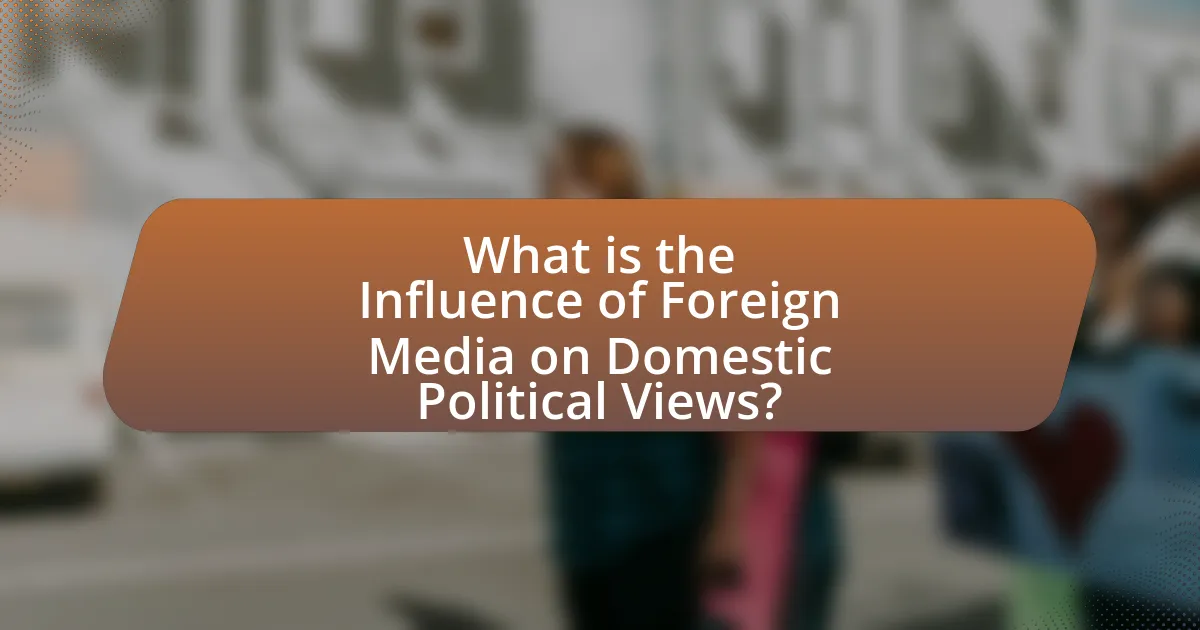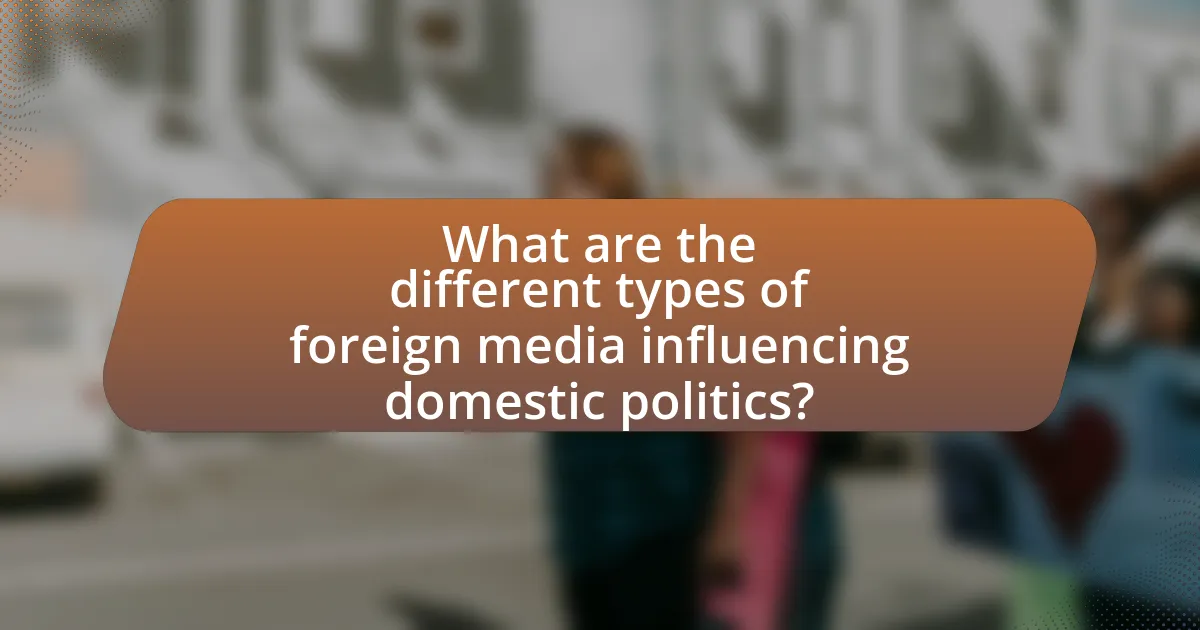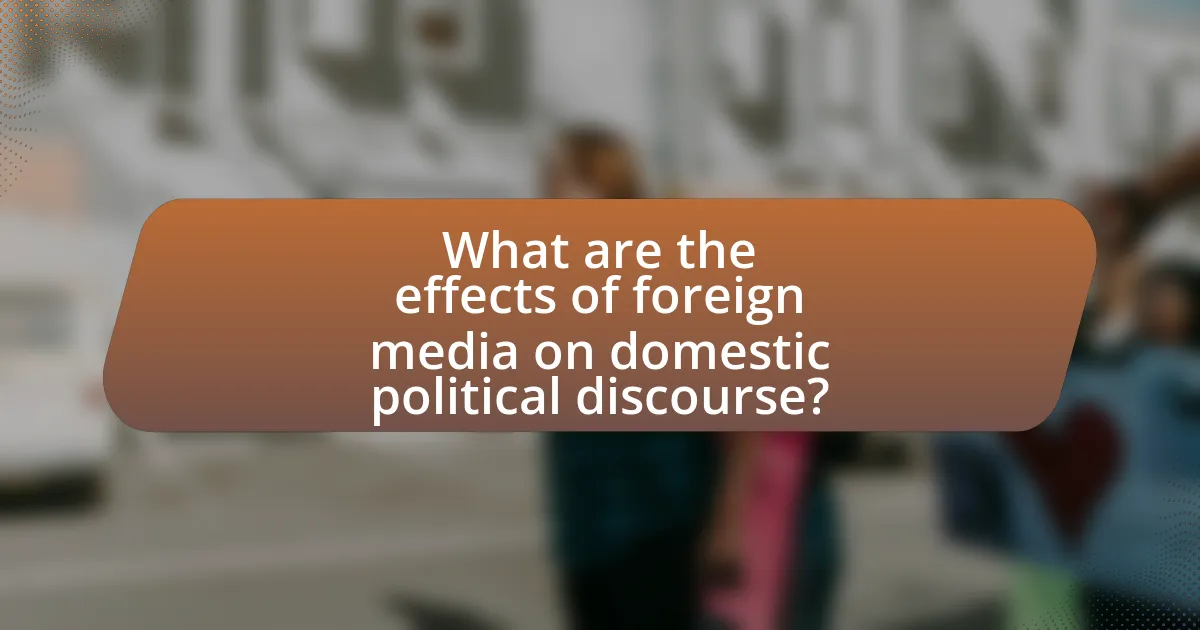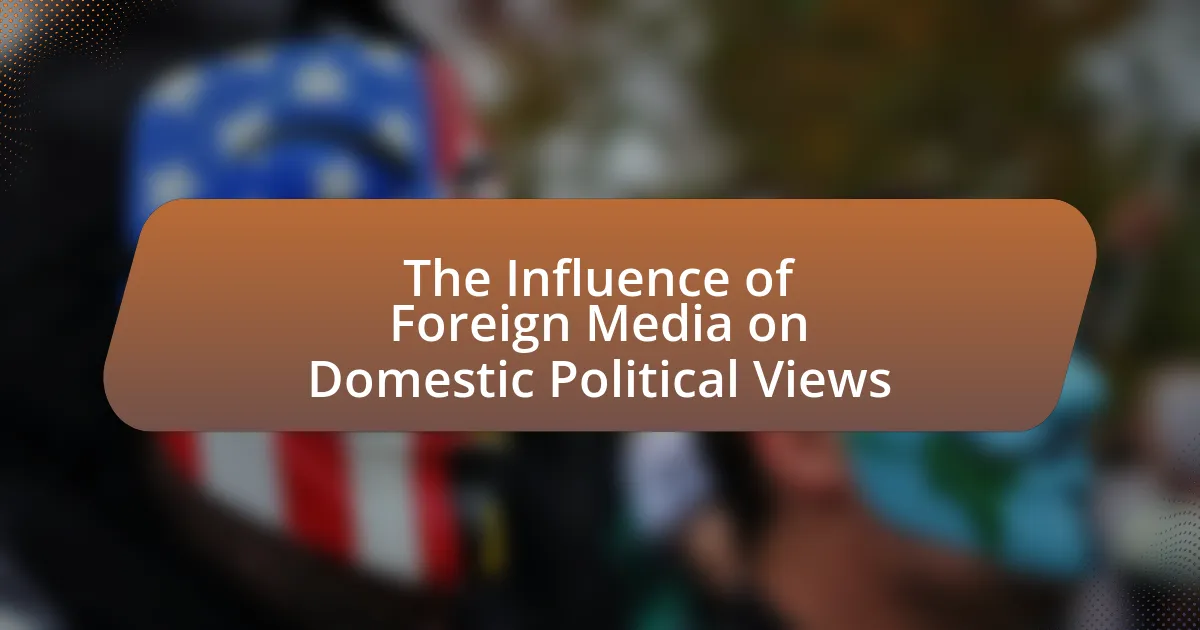The article examines the significant influence of foreign media on domestic political views, highlighting how exposure to international news can shape public perception and alter attitudes towards political issues. It discusses the mechanisms through which foreign media impacts domestic opinion, including information dissemination, framing, and agenda-setting, and explores the role of cultural differences in media reception. Additionally, the article addresses the implications of foreign media on political polarization, electoral outcomes, and the importance of media literacy in mitigating negative effects. It also outlines the various types of foreign media, including international news outlets and social media platforms, that contribute to shaping political narratives and public discourse.

What is the Influence of Foreign Media on Domestic Political Views?
Foreign media significantly influences domestic political views by shaping public perception and opinion through the dissemination of information and narratives. Research indicates that exposure to foreign media can alter citizens’ understanding of political issues, often leading to shifts in attitudes and behaviors. For instance, a study published in the Journal of Communication found that individuals who consume foreign news are more likely to adopt perspectives that align with the values and viewpoints presented in that media, particularly in authoritarian regimes where domestic media may be heavily censored. This influence is further amplified by social media platforms, which facilitate the rapid spread of foreign content, allowing diverse viewpoints to reach domestic audiences and potentially challenge prevailing political narratives.
How does foreign media shape public opinion in different countries?
Foreign media shapes public opinion in different countries by providing alternative narratives and perspectives that can influence local perceptions and attitudes. For instance, studies have shown that exposure to foreign news outlets can lead to shifts in public opinion regarding domestic policies, as seen in countries like Russia, where Western media coverage of political events has prompted public discourse around government actions. Additionally, the framing of international issues by foreign media can affect how citizens interpret their own government’s stance, as evidenced by the Arab Spring, where coverage by international networks galvanized public support for protests against authoritarian regimes.
What are the mechanisms through which foreign media influences domestic views?
Foreign media influences domestic views primarily through information dissemination, framing, and agenda-setting. Information dissemination occurs when foreign media outlets provide news and perspectives that may not be covered by domestic sources, thereby shaping public perception. For example, during the Arab Spring, international news coverage highlighted protests and government responses, influencing domestic opinions on governance and reform.
Framing refers to how foreign media presents issues, which can alter the interpretation of events. For instance, coverage of climate change by foreign media often emphasizes urgency and global cooperation, potentially swaying domestic audiences to prioritize environmental policies.
Agenda-setting occurs when foreign media highlights specific topics, leading domestic audiences to perceive these issues as important. Research by McCombs and Shaw (1972) demonstrated that media coverage significantly impacts public agenda, showing that when foreign media focuses on international crises, domestic audiences may prioritize those issues in their political discourse.
These mechanisms collectively illustrate how foreign media can shape domestic political views by providing alternative narratives, influencing public discourse, and altering perceptions of priority issues.
How do cultural differences affect the reception of foreign media?
Cultural differences significantly affect the reception of foreign media by influencing audience interpretation and engagement. For instance, varying cultural norms and values can lead to different understandings of humor, social issues, and narrative structures presented in foreign content. Research shows that audiences from collectivist cultures may prioritize community-oriented messages, while those from individualistic cultures may resonate more with personal stories. A study by Hofstede (1980) highlights how cultural dimensions, such as individualism versus collectivism, shape media consumption and interpretation. This indicates that cultural context is crucial in determining how foreign media is perceived and integrated into local political discourse.
Why is the influence of foreign media significant in today’s political landscape?
The influence of foreign media is significant in today’s political landscape because it shapes public opinion and political discourse across borders. Foreign media outlets often provide alternative perspectives on domestic issues, which can challenge prevailing narratives and influence voter behavior. For instance, during the 2016 U.S. presidential election, foreign media coverage highlighted different aspects of candidates’ policies, impacting how voters perceived them. Additionally, studies have shown that exposure to foreign news sources can lead to increased political engagement and awareness among citizens, as seen in research published by the Pew Research Center, which found that individuals consuming international news were more likely to discuss political issues. This demonstrates that foreign media plays a crucial role in informing and influencing domestic political views.
What role does foreign media play in shaping political narratives?
Foreign media significantly influences political narratives by providing alternative perspectives that can challenge or reinforce domestic viewpoints. This influence occurs through the dissemination of information that may not be covered by local media, thereby shaping public opinion and political discourse. For instance, during the Arab Spring, foreign news outlets played a crucial role in highlighting protests and government responses, which affected both domestic and international perceptions of the events. Studies have shown that exposure to foreign media can lead to shifts in public attitudes, as seen in research published by the Pew Research Center, which found that audiences exposed to international news sources often adopt more critical views of their governments.
How does foreign media impact electoral outcomes?
Foreign media significantly impacts electoral outcomes by shaping public opinion and influencing voter behavior. For instance, exposure to foreign news coverage can alter perceptions of political candidates and issues, often highlighting aspects that domestic media may overlook. Research conducted by the Pew Research Center in 2020 found that 63% of Americans reported that foreign news sources influenced their views on domestic politics, particularly during election cycles. This influence can manifest through framing effects, where the portrayal of events or candidates in foreign media can lead to shifts in voter preferences and increased polarization.

What are the different types of foreign media influencing domestic politics?
Different types of foreign media influencing domestic politics include international news outlets, social media platforms, and foreign state-sponsored media. International news outlets, such as BBC or Al Jazeera, provide coverage that can shape public opinion and political discourse within a country by presenting alternative narratives. Social media platforms, like Twitter and Facebook, facilitate the rapid spread of foreign information and opinions, often impacting political mobilization and activism. Foreign state-sponsored media, such as RT (Russia Today) or CGTN (China Global Television Network), aim to promote specific political agendas and influence domestic political views through targeted messaging and propaganda. These forms of foreign media can significantly affect domestic political landscapes by altering perceptions, framing issues, and influencing voter behavior.
How do traditional media and digital platforms differ in their influence?
Traditional media and digital platforms differ significantly in their influence on audiences, primarily in terms of reach, interactivity, and immediacy. Traditional media, such as television and newspapers, typically deliver content in a one-way communication model, where information is disseminated to a passive audience, resulting in limited audience engagement. In contrast, digital platforms, including social media and websites, facilitate two-way communication, allowing users to interact, share, and create content, which enhances engagement and personal investment in the information.
For instance, a study by the Pew Research Center in 2021 found that 53% of Americans reported getting news from social media, highlighting the shift towards digital platforms for information consumption. This shift indicates that digital platforms can influence public opinion more dynamically, as users can comment, share, and discuss content in real-time, leading to a more immediate impact on political views. Additionally, the algorithm-driven nature of digital platforms can create echo chambers, where users are exposed primarily to information that reinforces their existing beliefs, further differentiating their influence from traditional media, which often aims for broader audience reach.
What are the characteristics of traditional foreign media outlets?
Traditional foreign media outlets are characterized by their adherence to established journalistic standards, a focus on international news coverage, and a commitment to objectivity and impartiality. These outlets typically employ professional journalists who follow ethical guidelines, ensuring accuracy and fairness in reporting. For instance, major foreign media organizations like BBC and Reuters have long histories of providing comprehensive global news, which reinforces their credibility. Additionally, traditional foreign media often rely on a network of correspondents stationed around the world, allowing them to deliver firsthand accounts and in-depth analysis of events. This structure enables them to influence domestic political views by shaping public perception through their reporting on international issues.
How do social media platforms amplify foreign media messages?
Social media platforms amplify foreign media messages by enabling rapid dissemination and broad reach to diverse audiences. These platforms utilize algorithms that prioritize engaging content, allowing foreign media narratives to gain visibility and influence public opinion. For instance, a study by the Pew Research Center found that 62% of U.S. adults get news from social media, which often includes foreign sources, thereby shaping domestic political views through exposure to international perspectives. Additionally, the viral nature of shares and retweets can exponentially increase the reach of foreign media messages, further embedding them into the public discourse.
What are the sources of foreign media that impact domestic political views?
Foreign media sources that impact domestic political views include international news outlets, social media platforms, and foreign government-sponsored media. International news outlets, such as BBC, Al Jazeera, and Reuters, provide coverage of global events that can shape public perception and political discourse within a country. Social media platforms, like Twitter and Facebook, facilitate the rapid dissemination of foreign news and opinions, influencing domestic political discussions. Additionally, foreign government-sponsored media, such as RT (Russia Today) and CGTN (China Global Television Network), promote specific narratives that can sway public opinion and political attitudes in target countries. These sources collectively contribute to the formation of domestic political views by providing alternative perspectives and information that may not be covered by local media.
Which countries are the most influential in exporting media content?
The most influential countries in exporting media content are the United States, South Korea, and the United Kingdom. The United States dominates the global media landscape, with Hollywood producing a significant portion of the world’s films and television shows, contributing to its cultural influence. South Korea has gained prominence through the global popularity of K-pop and Korean dramas, which have expanded its cultural reach significantly in recent years. The United Kingdom also plays a crucial role, particularly through its television programming and news media, which are widely consumed internationally. These countries collectively shape global media trends and influence public opinion across various nations.
How do international news agencies contribute to this influence?
International news agencies contribute to the influence on domestic political views by providing a global perspective that shapes public opinion and political discourse. These agencies, such as Reuters and Associated Press, disseminate news that often highlights international events, policies, and crises, which can lead to increased awareness and concern among domestic audiences. For instance, coverage of foreign conflicts or economic issues can prompt citizens to reevaluate their own government’s policies in relation to global standards or humanitarian concerns. Research indicates that exposure to international news correlates with heightened political engagement and shifts in public sentiment, as seen in studies conducted by the Pew Research Center, which found that individuals who consume international news are more likely to express concern about global issues and advocate for policy changes at home.

What are the effects of foreign media on domestic political discourse?
Foreign media significantly influences domestic political discourse by shaping public opinion, framing political narratives, and introducing alternative viewpoints. For instance, studies have shown that exposure to foreign news sources can lead to increased political awareness and engagement among domestic audiences, as seen in countries where international media coverage highlights issues often overlooked by local outlets. Additionally, foreign media can challenge government narratives, prompting public debate and dissent, which was evident during the Arab Spring when international coverage of protests galvanized local populations. This influence is further supported by research indicating that citizens who consume foreign media are more likely to adopt critical perspectives on their own governments, thereby altering the political landscape.
How does foreign media contribute to polarization in domestic politics?
Foreign media contributes to polarization in domestic politics by amplifying divisive narratives and framing issues in ways that resonate with specific ideological groups. This amplification occurs through selective reporting and the promotion of partisan viewpoints, which can lead to increased distrust among citizens towards opposing political factions. For instance, studies have shown that exposure to foreign media outlets that align with particular political ideologies can reinforce existing biases, as seen in the case of Russian media influencing public opinion in various Western democracies. This influence is evidenced by the rise in polarized sentiments during election cycles, where foreign media narratives often exploit social and political tensions, thereby exacerbating divisions within the domestic political landscape.
What evidence exists linking foreign media consumption to political division?
Evidence linking foreign media consumption to political division includes studies showing that exposure to foreign news sources can reinforce partisan beliefs and create polarized viewpoints. For instance, research by the Pew Research Center indicates that individuals who consume foreign media are more likely to adopt extreme political positions, as they often encounter narratives that align with their pre-existing biases. Additionally, a study published in the Journal of Communication found that audiences exposed to foreign media narratives tend to distrust domestic institutions, further deepening political divides. These findings suggest a clear correlation between foreign media consumption and increased political polarization.
How do different demographics respond to foreign media content?
Different demographics respond to foreign media content in varied ways, influenced by factors such as age, education, cultural background, and political orientation. For instance, younger audiences tend to engage more with foreign media, often seeking diverse perspectives that challenge their local narratives, while older demographics may prefer familiar content that aligns with their established views. Research indicates that individuals with higher education levels are more likely to critically analyze foreign media, leading to a nuanced understanding of global issues. Additionally, cultural background plays a significant role; individuals from multicultural environments may be more receptive to foreign media, as they are accustomed to diverse viewpoints. Studies, such as those conducted by the Pew Research Center, show that political orientation also affects responses, with liberal individuals more likely to embrace foreign media that aligns with progressive values, while conservatives may be skeptical of content perceived as undermining national interests.
What strategies can be employed to mitigate the negative effects of foreign media?
To mitigate the negative effects of foreign media, governments and organizations can implement media literacy programs that educate citizens on critical consumption of information. These programs enhance individuals’ ability to analyze and evaluate media content, reducing susceptibility to misinformation and biased narratives. Research indicates that media literacy can significantly improve critical thinking skills, as demonstrated in studies by the National Association for Media Literacy Education, which found that participants in such programs were better equipped to discern credible sources from unreliable ones. Additionally, promoting local content through subsidies or incentives can help strengthen domestic media industries, providing audiences with alternative narratives that counteract foreign influences.
How can media literacy programs help audiences critically evaluate foreign media?
Media literacy programs can help audiences critically evaluate foreign media by equipping them with the skills to analyze, assess, and interpret media content effectively. These programs teach individuals to recognize biases, understand the context of information, and differentiate between credible sources and misinformation. For instance, research from the National Association for Media Literacy Education indicates that participants in media literacy initiatives demonstrate improved critical thinking skills and a greater ability to discern the reliability of various media outlets. This enhanced capability allows audiences to engage with foreign media more thoughtfully, ultimately leading to more informed opinions and decisions regarding domestic political views influenced by external narratives.
What role do policymakers play in regulating foreign media influence?
Policymakers play a crucial role in regulating foreign media influence by establishing laws and guidelines that govern the dissemination of foreign content within their jurisdictions. They implement regulations to ensure that foreign media does not undermine national security, promote misinformation, or interfere in domestic political processes. For instance, the Foreign Agents Registration Act in the United States requires foreign entities engaged in political activities to disclose their relationships and funding sources, thereby increasing transparency and accountability. Additionally, policymakers may impose restrictions on foreign media ownership and content to protect local cultural values and political integrity, as seen in various countries that limit foreign investment in media outlets. These actions are essential for maintaining a balanced media landscape and safeguarding democratic processes from external manipulation.
What best practices can individuals adopt to navigate foreign media influence?
Individuals can navigate foreign media influence by critically evaluating sources, cross-referencing information, and understanding the context of the media’s origin. Critical evaluation involves assessing the credibility of the media outlet, including its ownership, funding, and potential biases. Cross-referencing information with multiple reputable sources helps to verify facts and provides a more balanced perspective. Understanding the context includes recognizing the political, cultural, and economic factors that may shape the media’s narrative. Research indicates that media literacy programs can enhance individuals’ ability to discern credible information, thereby reducing susceptibility to foreign influence (Hobbs, 2017, “Media Literacy: A National Priority for a Changing World,” National Association for Media Literacy Education).
